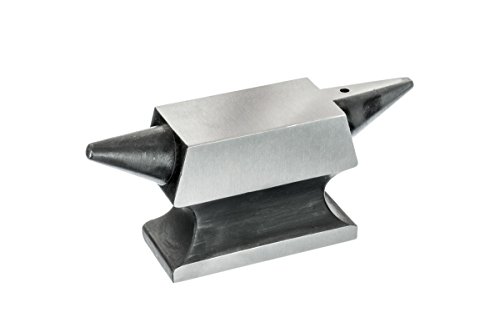For the most part, modern anvils are made for either jeweler’s or blacksmiths. Jeweler’s anvils will be smaller, and made of different materials, but can be invaluable for working with soft metals like silver or gold to create hand-finished pieces. Larger anvils are commonly used for anything the modern blacksmith can contrive, from blades to fancy art pieces. We’ll help you decide which one you need in order to add some real, old-fashioned metalworking capabilities to your workshop. But first . . .
Let’s take a look at our reviews of the 4 best anvils on the market:
Solid Stainless Steel Mini Jewelry Anvil Wire Work Tool
This stainless steel mini-anvil is great if you’re looking to work with wire or soft metals. It’s specifically designed for helping with wire work and features both tapered and sharp ends which will allow you to kink or make loops as the case may be. The small striking surface can be used to hammer metal flat from its initial wire form, and if jewelry making is your game you’re likely to be impressed by the fact that it measures a bit less than five inches from horn to horn.
Olympia Tools 38-785 100 lb. Anvil
The Olympia Tools 38-785 100 lb. anvil is the heavyweight solution to jeweling, blacksmithing, metalcraft, and more. This anvil is a heavy-duty solution to virtually any hammer-on-metal need, and it weighs a full 100 lbs. to ensure that once you have it where you want it, it won’t move.
This anvil is crafted from cast iron, making it dense, strong, and durable. The polished surface gives it a fine sheen for your workshop, and the extra-long horn gives you tons of options for angling, hammering, and more when you work with your favorite metal. In fact, this anvil is so versatile that you can use it for leatherworking as well.
While this anvil is smaller than the typical blacksmith anvil you may find on TV or in a museum, it’s designed to stand up to repeated hammerblows time and time again. Plus, with so many different ways to use it, this could be your only anvil in a metalshop that works with jewelry, strong metals, leather, and other materials.
That makes it great for a small business or artisan who likes to work with old-fashioned tools to give their work more character and a unique sensibility, compared to machine-crafted products. While the price point may be a little high for a hobbyist, it’s still among the best anvils for the money, especially to have on hand if you want a quality product that’ll last for years!
SE 8753JA Jewelers Anvil
Like the first product, this one is another jeweler’s anvil and comes with the added bonus of a 3/8” tap so that you can mount it semi-permanently to your work bench and prevent it from moving. The horns are quite handy, one being flat topped and the other being a full cone which will allow you to form your project however you might wish, and it makes an invaluable addition to the workshop of any jeweler who’s tight on space in their workshop.
2lb Mini Anvil Rivet Tool
Unlike the above jeweler’s anvils, this little 2lb wonder (see full specs) is suitable for any small metal working projects you might need, not just for the softer metals associated with art. You’ll find that it does the job perfectly, provided you can work with the smaller size. Think of this one more as a mini-anvil than an actual jeweler’s anvil and you’re on the right track, even those who don’t work with metal very often will probably be able to find plenty of uses for it on their bench.
Picking the Best Anvil for You
What anvil you’re looking for depends largely on what you’re doing.
Jewelry anvils are great for smaller projects, but there’s a bit of a caveat to using them: they don’t hold up really well if you’re intent on working with harder materials. If you’re trying to flatten a piece of hardened steel, especially after heating, you’re going to run into problems with damaging the surface and that can make the anvil useless after a small period of time.
‘
They really are something anyone who’s serious about wire-working or silversmithing should have around, though. They will make jobs quite a bit simpler and you’ll have one place to handle everything from shaping to coiling.
Tool anvils are smaller than regular anvils but suitable for heavy duty work. You’ll find they’re perfect for small shaping tasks, straightening wire, or anything else where you might need to take a hammer to a chunk of metal. They tend to be quite cheap, especially as many are made of cast iron.
Unfortunately, they’re really not suitable for more serious fabrication work and mostly just make a handy place to hit stuff with a hammer.
Forged anvils are often almost outrageously expensive, hard to find, hard to move, and commonly weigh at least fifty pounds. A good-sized one for a bladesmith generally isn’t something you’ll find online, and don’t be surprised if you find yourself looking at a hefty price tag.
That makes the Olympia (see full specs) above something special. It’s big enough for most aesthetic work and even smaller folding knife blades, without an absolute devastation being caused to your bank account. It’s also light enough most folks will be able to move it on occasion without hurting themselves.
You will be paying out the nose for a good, forged anvil, but if you’re actually interested in the blacksmith’s journey, it’s really the only way to start.
Anvil Common Uses
Other than blacksmithing a lot of people can’t see a whole bunch of need to have even a small anvil around, except maybe as a nifty paperweight.
Mini-anvils can be extraordinarily useful for any kind of craftsman, however, not just artisans. While any wireworker will readily have some appreciation for a jeweler’s anvil, even the home handyman will find a lot of use for one.
Straightening nails is one of the most common uses you’ll find people at home using them for. Flattening wire is another, and shaping wire for electrical connections so you have a guaranteed tight fit can be done easily by using the horn.
Warped screwdriver edge? Heat it up with a torch and pound it flat again. With some clever thinking, you can even use the straight side to fix a flathead. Chipped chisel? Some application of heat and force can sort it right out before you get it back to the bench grinder.
Even the best anvil may not be essential, but it can make life a whole lot easier for anyone who commonly works with tools. Even better, jeweler’s and tool anvils don’t cost much money or take up much space. Grab the best anvil you can afford and see what you can do with it. You’re likely to be quite impressed at the end of the day. Good luck!








